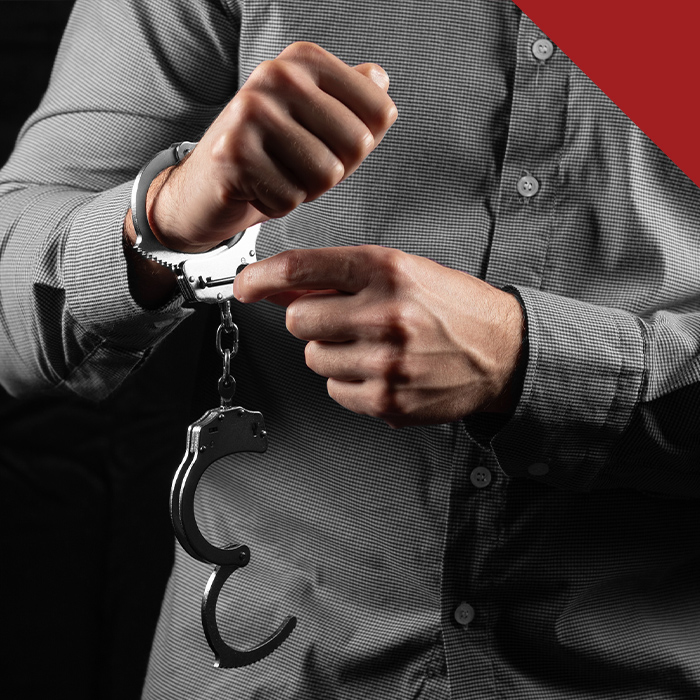
Juvenile Criminal Attorney in Forsyth County
Protecting Futures & Providing Guidance for Forsyth County Families
When your child faces juvenile charges in Forsyth County, securing a trusted juvenile criminal defense attorney brings clarity during an overwhelming time. At The Epps Law Group, we stand by families and minors, delivering steady guidance while working to protect each child's future. We treat every client with individual attention and thoughtful solutions, making sure you always know you have someone in your corner.
The Forsyth County Juvenile Court process prioritizes rehabilitation, but the results can vary with each case depending on age, circumstances, or prior history. Our knowledge of local processes and juvenile law means we can help you understand the potential outcomes. As a juvenile defense lawyer in Forsyth County, our support ensures quick, well-advised actions.
Protect your child from adult prosecution. Call a proven juvenile criminal attorney in Forsyth County at (678) 257-4507 or contact us online now for 24/7 availability and a free consultation.
Understanding Juvenile Crimes in Georgia
In Georgia, a person is generally under the jurisdiction of the Juvenile Court if they are under 17 years old and are accused of an offense. The central goal of the Juvenile Court is to provide supervision, care, and rehabilitation that promotes the child's development, as opposed to simply inflicting punishment. This goal requires a distinct legal approach from a Forsyth County juvenile crimes lawyer.
Georgia law divides offenses involving minors into distinct categories:
- Delinquent Act: This is the juvenile equivalent of a crime. It is an act committed by a child under 17 that would be considered a felony, misdemeanor, or even a traffic violation if committed by an adult. The majority of charges handled by our firm—including theft, assault, drug possession, and vandalism—fall under this category.
- Unruly Child (Status Offense): This is an act committed by a child that is only considered illegal because of their age. Examples include running away, truancy (skipping school), or habitually disobeying reasonable commands from a parent. These cases are generally less severe, but still result in Juvenile Court supervision.
A child found responsible for a delinquent act is "adjudicated delinquent," not "convicted," but this distinction offers little comfort when the record impacts their life decades later.
The Most Serious Threat: Mandatory Transfer to Adult Court
For a child aged 13 to 17, the most devastating threat is the possibility of being transferred from the Juvenile Court system to the Superior Court (Adult Court) to be tried as an adult. When a transfer occurs, the case is removed from the rehabilitative environment of the Juvenile Court and is subject to the severe felony sentencing structure of the adult criminal justice system—including decades in prison.
Mandatory Transfer (The "Seven Deadly Sins")
Georgia law mandates that the Superior Court has exclusive jurisdiction (meaning the case must be filed in adult court) for children aged 13 or older who are charged with one of the "Seven Deadly Sins" and other serious offenses, including:
- Murder or Second-Degree Murder
- Voluntary Manslaughter
- Rape
- Armed Robbery (if committed with a firearm)
- Aggravated Sodomy
- Aggravated Child Molestation
If your child is charged with one of these crimes, you need a juvenile criminal attorney in Forsyth County who is prepared to immediately petition the Superior Court for a Reverse Transfer back to the Juvenile Court.
Discretionary Transfer
In other serious felony cases, the Juvenile Court Judge may hold a transfer hearing to determine whether to waive jurisdiction to the Superior Court. At this hearing, the judge considers factors such as the child's maturity, the seriousness of the offense, and the available rehabilitation programs.
We use our firm’s unique background, including insight gained from serving as a Judge Pro Tem, to effectively present compelling mitigation evidence and argue forcefully against transfer, keeping the case in the protective embrace of the Juvenile Court.
Key Procedural Differences and Rights in Forsyth County Juvenile Court
While juveniles enjoy the same fundamental constitutional rights as adults (e.g., right to counsel, right to remain silent), the procedures in Forsyth County Juvenile Court differ significantly from those in Superior Court. Understanding these differences is crucial for a successful defense from a skilled Forsyth County juvenile crimes lawyer.
- Detention Hearing: Instead of a bail hearing, a Detention Hearing is held to determine if continued physical custody is necessary. We argue against detention, presenting alternatives like house arrest or supervision, enabling the child to return home.
- Adjudicatory Hearing: This is the equivalent of a jury trial, but in Juvenile Court, the hearing is often held before a judge, who determines if the child committed the alleged delinquent act beyond a reasonable doubt.
- Disposition Hearing: If a child is adjudicated delinquent, the Disposition Hearing is the equivalent of sentencing. The focus here is on the child's need for treatment and rehabilitation, not the severity of the punishment. We work with counselors and mitigation specialists to develop a comprehensive plan that proposes alternatives to detention.
We ensure your child’s rights, especially the right to silence and the proper waiver of Miranda rights, are protected from the moment of first contact with law enforcement. Our firm is the assertive juvenile criminal attorney in Forsyth County you need for these high-stakes hearings.
Consequences Beyond Detention: The Permanent Record
Many parents mistakenly believe that juvenile records are automatically sealed upon reaching the age of 18. This is false under Georgia law. An adjudication of delinquency can remain a significant barrier for years, demanding the intervention of a proactive Forsyth County juvenile crimes lawyer to pursue record restriction.
- Educational Barriers: A juvenile record can negatively impact applications for private schools, universities, financial aid, and scholarships.
- Military and Employment: It can bar a child from joining the military or securing certain employment positions that require background checks.
- Driving Privileges: Certain juvenile offenses, including drug or alcohol violations, can result in the loss of driving privileges for an extended period.
To avoid these consequences entirely, our firm strives to achieve one of two outcomes: a Dismissal of the petition, or an entry into a Diversion Program. Diversion programs allow the child to complete community service, counseling, or education in exchange for the charges being dropped, preventing any formal adjudication from taking place.
Our Comprehensive Defense Approach for Juvenile Crimes
At The Epps Law Group, we utilize our firm’s multi-faceted background, which includes serving as former prosecutors and a Juvenile Court Judge Pro Tem, to build a defense that anticipates every move by the State.
- Challenging Police Procedure and Confessions: Juveniles are particularly vulnerable during police questioning. We aggressively challenge the admissibility of any statements or "confessions," arguing that the child did not understand their rights or that the police failed to comply with the procedural rules unique to juvenile law in Georgia.
- Fighting Adjudication at Trial: We leverage weaknesses in the State's evidence to raise reasonable doubt. Whether it's inconsistencies in witness statements, flawed forensic evidence, or a lack of proof of intent, we are prepared to litigate the facts at the adjudicatory hearing.
- Grand Jury and Reverse Transfer Advocacy: For the most serious cases, we proactively intervene at the Superior Court level. Our firm is skilled at preparing and presenting persuasive arguments to the court, emphasizing the child’s rehabilitative potential and seeking a transfer of the case back down to the Juvenile Court where therapeutic options are available. This specialized defense is what sets our firm apart as a leading juvenile criminal attorney in Forsyth County.
- Presenting a Rehabilitative Plan (Disposition Advocacy): If the facts lead to an adjudication, we work with your family, school officials, and mental health professionals to create a compelling, personalized Disposition Plan that focuses on counseling, community service, and education, rather than confinement in a Regional Youth Detention Center (RYDC). This advocacy is crucial for every Forsyth County juvenile crimes lawyer representing a child.
We are committed to achieving a result that preserves your child's educational and career opportunities. Our firm is your essential advocate. We are ready to fight for your child.
What to Expect in the Forsyth County Juvenile Court Process
The juvenile process in Forsyth County includes multiple phases designed to support rehabilitation and accountability. Hearings take place in Forsyth County Juvenile Court, where minors encounter options and programs not available in adult courts. By knowing what comes next, families feel more prepared and less anxious.
- Intake and assessment: After law enforcement makes a referral, an intake officer evaluates the facts and decides if the case qualifies for release, diversion, or formal charges.
- Detention hearings: If there is a need, the court quickly reviews whether a minor should stay in custody or return home while the case progresses.
- Adjudication: In this fact-finding step, the court determines whether the alleged act occurred. Both sides present evidence, and the judge decides based on the law and facts presented.
- Disposition: When the court finds legal responsibility, the judge issues a ruling that focuses on counseling, community service, or other measures to help restore young people and prevent future issues.
Having a knowledgeable juvenile defense attorney in Forsyth County helps keep you informed about your rights and options at each step. The law requires a parent or guardian to attend court with the child, which promotes family involvement in the process.
Why Choose Our Juvenile Criminal Defense Team in Forsyth County
Families across Forsyth County rely on our team because we deliver compassionate, professional representation. Led by Attorney Kyle E. Epps III, our firm has deep roots in local juvenile defense practice. Your calls and concerns matter to us—clear communication and reliable legal support set us apart from other juvenile criminal lawyers in Forsyth County.
We understand that families often worry about how a juvenile charge can impact school, work, and family routines. Our familiarity with Forsyth County agencies—such as local judges, school resource officers, probation officers, and community diversion programs—allows us to provide you with nuanced, practical advice.
Whether you're concerned about the process, timelines, or your child’s future, we explain Forsyth County’s approach in straightforward language. We value transparency and regular communication, so that you always know what's ahead and feel fully supported.
Reach Out to Protect Your Child’s Future Today
Our team listens carefully, answers your questions about local law, and develops solutions that defend your child’s rights and long-term interests. You’ll have a trusted partner focused on communication, diligent defense strategy, and achieving the most positive resolution possible for your child and family.
If your family faces a juvenile charge in Forsyth County, connect with The Epps Law Group at (678) 257-4507 to set up a confidential case evaluation.
FAQs
What happens when a juvenile is charged with a crime in Forsyth County?
Juvenile charges start with an intake assessment and continue through different phases—detention, adjudication, and disposition—under the juvenile court system’s rules. The main focus centers on support and rehabilitation.
Will my child have a permanent criminal record?
Many juvenile cases remain confidential and may be sealed or limited from public access when certain conditions are met. The final impact depends on the case and the court’s orders.
Can a juvenile be tried as an adult in Forsyth County?
Under certain Georgia statutes, very serious charges can move to adult court, but most cases remain in juvenile court, which prioritizes rehabilitation and community-based outcomes.
What should I do if law enforcement contacts my child?
Reach out to a juvenile defense attorney in Forsyth County before your child answers questions. Prompt legal advice protects rights and ensures the right steps from the outset.
How do diversion programs work in Forsyth County?
Diversion programs allow eligible cases to avoid court and resolve charges through counseling or community-based solutions, often minimizing long-term harm. We discuss eligibility and guide families through the process.

5-Star Reviews
READ WHAT OUR CLIENTS ARE SAYING ABOUT US
-
"Appreciate this experience"Honestly, I was very worried for this case that I had. But Mr. Epps and his assistant are extremely helpful and comforting. They answered every single question I had without any issue, and in the end got my case dismissed. 100% would recommend and believe he is amazing at his job!!- Sarah
-
"Amazing"With such a short amount of time, he delivered the exact results I needed and I am so grateful for his service + patience! A true superstar- Moyo
-
"Great communication"Epps is a lifesaver. He handled my complex case, explaining every step along the way. Great communication, answers calls and questions. Would definitely recommend.- Donald
-
"The best of the best"One of the best lawyer that I ever met in my life. I can’t describe how much gratitude I have for him and the most up respect I have for Kyle. He saved my life from being locked up for a long time. Thank you Kyle!- Anonymous
-
"Excellent service!!!"Kyle knew exactly what was needed to handle my case. His no nonsense approach is what I was looking for. The Epps Law Group, will always be my “go to” legal team.- Shaun
-
"Great job"
I'm glad whit all you guy. You did a great job representing me in all this case. Thank you so much
- Rodwin -
"The Hodge Family Approves"Attorney Kyle Epps and his legal team provided exceptional assistance across multiple cases. Epps's direct approach ensured clear communication and straightforward guidance at every turn. What truly stood out was their caring and dedicated manner—they went above and beyond to support me throughout each case. Their commitment to achieving the best outcomes was unwavering, leaving no detail overlooked. I'm immensely grateful for their expertise and professionalism, and I highly recommend Attorney Epps and his team to anyone seeking stellar legal representation.- Anonymous
-
"An amazing attorney & team"I can’t thank Mr Epps and his firm for the wonderful job they did for my son. We left court today in awe with the out come of his case. With looking at possible jail time and 3 years probation he walked away with one year probation and his record will be cleared once completed. Mr Epps has represented other family members as well with great out comes.
I definitely recommend Mr Epps and his firm if your in need of an attorney. He not only stands up to bat for you but treats you like family.- Joan


With a background as a police officer, prosecutor, and Judge Pro Tem, The Epps Law Group can provide you or your loved one with detailed and trusted representation. Our attorney has been involved in the criminal justice system for more than 30 years. Put our experience on your side.

Why Choose Us?
See What Sets Us Apart
-
Dedicated TeamSkillful legal counsel that carefully and meticulously examines all aspects of the case for critical information.
-
Unquestioned IntegrityA reputation of treating judges and prosecutors with honesty allowing him to be taken seriously when it could matter the most.
-
Former Police OfficerThe knowledge that comes from a former police officer to serve clients needing accomplished criminal defense representation.
-
30 Years of ExperienceOver 30 years of legal experience as a prosecutor and Judge Pro Tem, we can use insights from that experience to help you.
